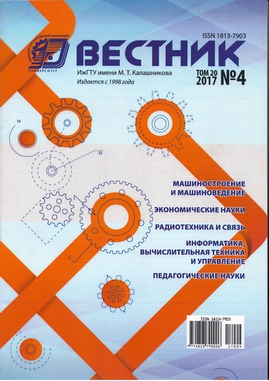Использование маркетингового динамического потенциала в процессе диверсификации предприятий оборонно-промышленного комплекса
DOI:
https://doi.org/10.22213/2413-1172-2017-4-38-42Ключевые слова:
диверсификация, маркетинг, концепция динамических способностей, маркетинговый динамический потенциалАннотация
Обоснована актуальность развития маркетингового динамического потенциала предприятий оборонно-промышленного комплекса в условиях диверсификации как источника некопируемых конкурентных преимуществ в условиях динамичной внешней среды при переходе к выпуску продукции гражданского и двойного назначения. Проведен анализ теоретического содержания динамических способностей предприятий, обоснована структура маркетингового динамического потенциала, исследована взаимосвязь процессов диверсификации и маркетингового динамического потенциала предприятия. Исследована роль маркетингового динамического потенциала при формировании стратегического характера экономической деятельности предприятия, его гибкости, мобильности, способности к адаптации, приращению его капитализации, инвестиционной привлекательности. Выделены две основные группы, составляющие ресурсы динамического потенциала, представленные материальными и нематериальными активами. Определены базовые динамические способности на уровнях оперативной, тактической и стратегической маркетинговой деятельности предприятий оборонно-промышленного комплекса: способность формировать и использовать каналы маркетинговых коммуникаций; способность создавать и обеспечивать работу каналов товародвижения; непрерывное сегментирование; позиционирование; способность формировать маркетинговые стратегии и политику работы на рынках; разрабатывать новые товары (модифицировать имеющиеся), создавать партнерские отношения, интегрироваться в бизнес-сети; создавать и управлять брендами; создавать стратегии предприятия; согласовывать интересы стейкхолдеров; формировать инвестиционную привлекательность бизнеса. Установлена взаимосвязь между динамическими способностями и ресурсами маркетинговой деятельности.Библиографические ссылки
Тис Д. Дж. Выявление динамических способностей: природа и микрооснования (устойчивых) результатов компании // Российский журнал менеджмента. 2009. Т. 7, № 4. С. 59-108.
Дэвис Дж., Маркис К. Будущее организационной теории в начале XXI века: институциональные поля и механизмы // Теория организации : хрестоматия : пер. с англ. / под ред. Т. Н. Клеминой. СПб., 2009. С. 27-57.
Андреева Т. Е., Чайка В. А. Динамические способности фирмы: что необходимо, чтобы они были динамическими? // Научные доклады. 2006. № 2(R) / НИИ менеджмента СПбГУ. СПб, 2006.
Там же.
Идрисов А. Стратегия, основанная на ключевых компетенциях и динамических способностях [Электронный ресурс]. URL: http://iteam.ru/publications/ strategy/section_17/article_145
Тис Д. Дж. Указ. соч.
Дэвис Дж., Маркис К. Указ. соч.
Андреева Т. Е., Чайка В. А. Указ. соч.
Идрисов А. Указ. соч.
Соболев Н. Динамический потенциал фирмы // Актуальные вопросы современного управления и статистики. 2001. Вып. 3. С. 72-77.
Голубев С. С., Крещенко М. А. Государственно-частное партнерство при подготовке кадров для предприятий оборонно-промышленного комплекса России // Современные наукоемкие технологии. 2016. № 11-2. С. 245-248.


